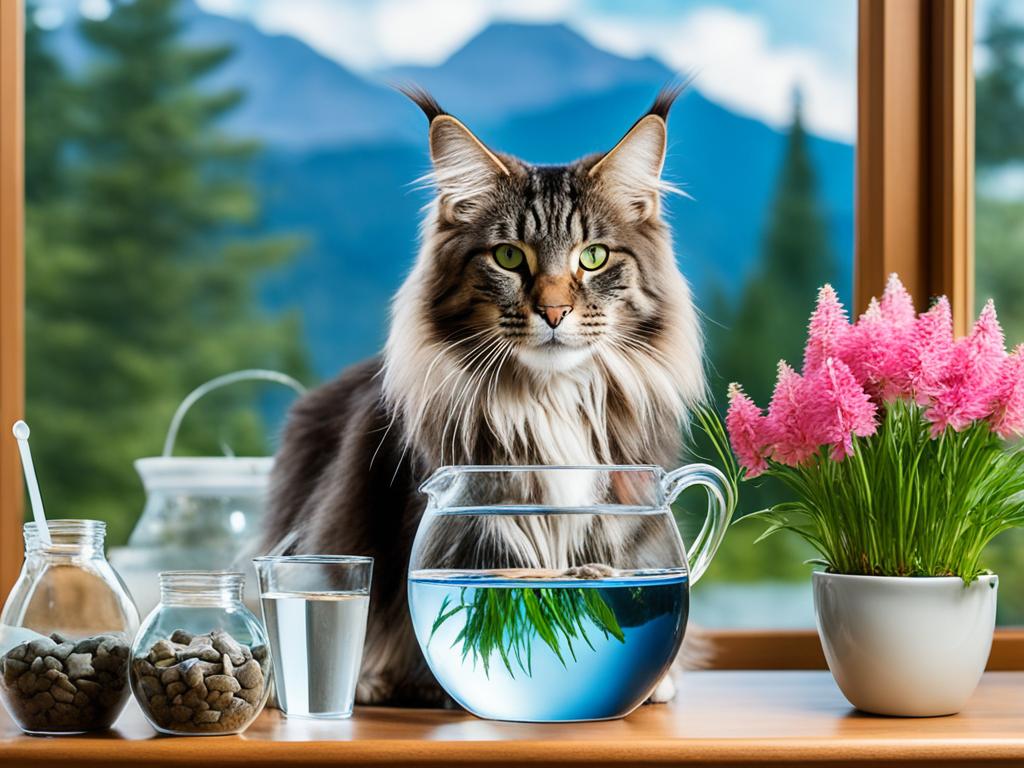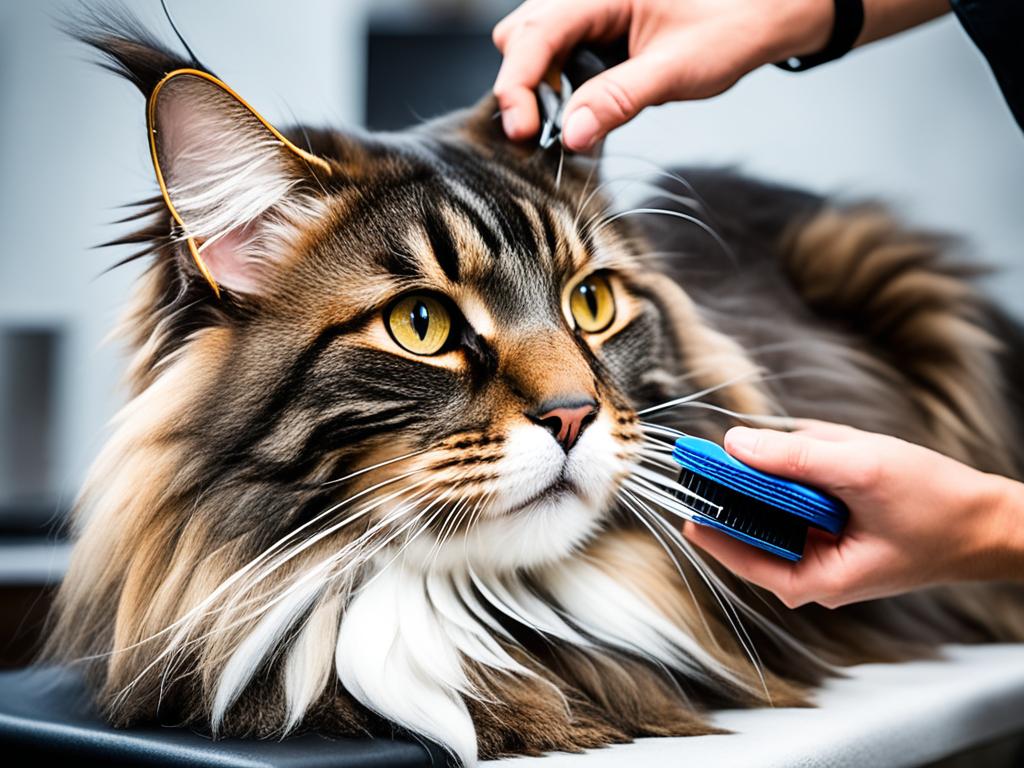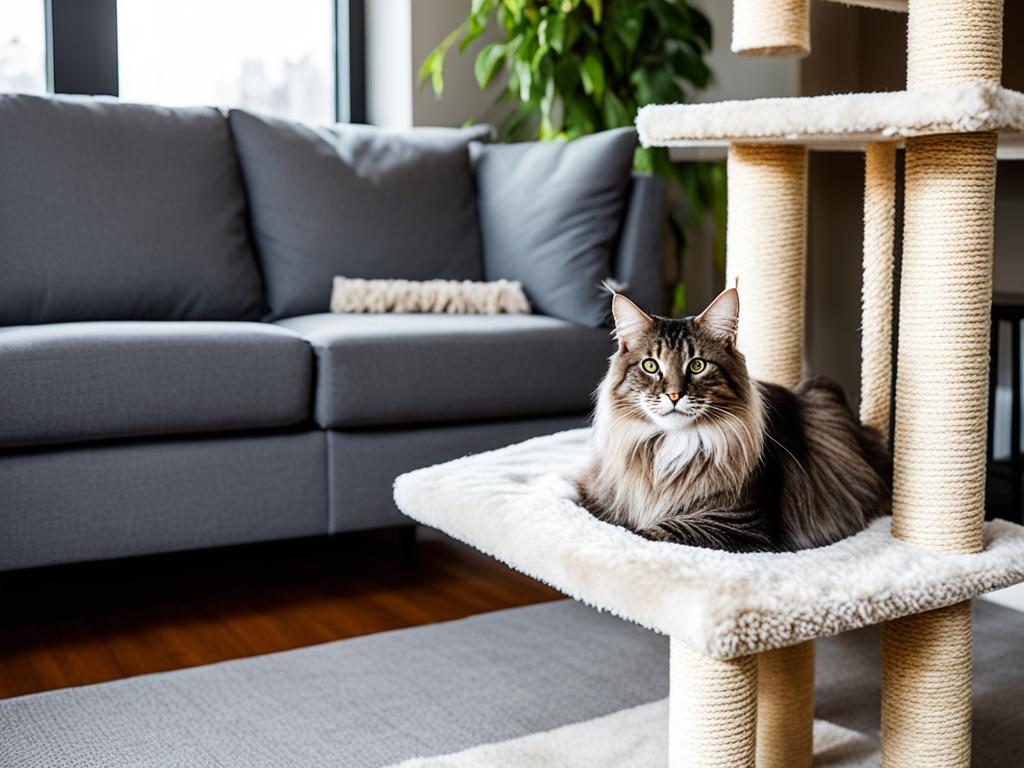Taking care of a Maine Coon requires commitment and preparation. Before bringing home your new feline friend, it’s important to make sure your home is ready to provide a comfortable and safe environment. This section will provide essential tips for preparing your home to ensure a welcoming space for your Maine Coon.
Key Takeaways:
- Creating a welcoming and safe environment is crucial for your Maine Coon’s well-being.
- Proper nutrition, clean water, suitable litter boxes, and regular exercise are essential for your Maine Coon’s care.
- Grooming regularly and providing social interaction are important for a happy and healthy Maine Coon.
- Introduce your Maine Coon to designated scratching posts and secure your home to prevent accidents.
- Enjoy the journey of being a Maine Coon owner and treasure the love and companionship your furry friend brings.
Feeding Your Maine Coon
Proper nutrition is crucial for the health and well-being of your Maine Coon. By providing a balanced and nutritious diet, you can ensure that your cat thrives and maintains optimal health. Here, we will discuss the essential aspects of feeding your Maine Coon, including selecting the right cat food, establishing a feeding schedule, and understanding the benefits of different food options.
Choosing the Right Cat Food
When it comes to choosing the best food for your Maine Coon, opt for high-quality cat food that is specially formulated for their specific needs. Look for a brand that offers a balanced combination of proteins, fats, and carbohydrates to support their overall health and provide them with the necessary nutrients.
Recommended Maine Coon Cat Food: It’s important to choose cat food that is rich in proteins, moderate in fats, and low in carbohydrates. This helps maintain their muscle mass, supports their energy levels, and prevents excessive weight gain. Some recommended cat food brands for Maine Coons include Royal Canin Maine Coon, Blue Buffalo Wilderness, and Merrick Purrfect Bistro.
Feeding Schedules
Establishing a regular feeding schedule is essential for your Maine Coon’s overall well-being. This helps prevent overeating, maintain a healthy weight, and establish a routine for them.
Typically, it is recommended to feed adult Maine Coons two meals a day, with ample portions to meet their dietary needs. However, as each cat may have different preferences and dietary requirements, it is essential to consult with your veterinarian for personalized feeding guidelines.
Wet Food vs. Dry Food
When it comes to feeding Maine Coons, both wet and dry cat food options have their benefits. Wet food provides hydration and supports urinary health, while dry food helps maintain dental health and can be more convenient to store.
Many cat owners choose to feed a combination of wet and dry food to ensure their Maine Coon receives the advantages of both. You can consult with your vet to determine the ideal balance for your cat’s specific needs.
Feeding Guide
To ensure you are providing your Maine Coon with the appropriate portion sizes, refer to the feeding guide on the cat food packaging. This guide takes into account your cat’s weight, age, and activity levels to determine the recommended amount of food to feed them.
Protein and Nutritional Content in Recommended Maine Coon Cat Food Brands
| Cat Food Brand | Protein Content (%) | Fat Content (%) | Carbohydrate Content (%) |
|---|---|---|---|
| Royal Canin Maine Coon | 34 | 20 | 32 |
| Blue Buffalo Wilderness | 40 | 18 | 28 |
| Merrick Purrfect Bistro | 38 | 16 | 34 |
It is important to note that every cat is unique, and their dietary needs may vary. Consult with your veterinarian to determine the most suitable cat food brand and feeding plan for your Maine Coon.
Feeding your Maine Coon a nutritious diet is crucial for their health and well-being. By selecting high-quality cat food, establishing a feeding schedule, and providing the right balance of wet and dry food, you can help your Maine Coon thrive and lead a happy, healthy life.
Providing Clean Water and Litter Boxes
Maintaining a clean and accessible water source is essential for your Maine Coon’s health. It is crucial to provide your Maine Coon with a continuous supply of clean water and suitable water bowls. Hydration plays a vital role in promoting overall well-being and preventing potential health issues.
When it comes to water bowls, choose options that are spacious and easy for your Maine Coon to access. Avoid bowls that are too shallow or narrow, as they may lead to discomfort or spillage.
To ensure optimal water quality, remember to clean and refill the water bowl daily. This practice helps eliminate bacteria buildup and provides your Maine Coon with fresh, clean water throughout the day. Regularly washing the bowl with mild dish soap and warm water is sufficient for maintaining cleanliness.

In addition to clean water, providing appropriate litter boxes is crucial to ensure your Maine Coon’s hygiene and facilitate successful litter box training. Maine Coon cats are generally large in size; therefore, opt for spacious litter boxes that accommodate their size comfortably.
Place the litter boxes in quiet and accessible areas of your home, away from their feeding area. Maine Coons prefer privacy when using their litter boxes, so ensuring a peaceful space will encourage their natural instinct to use the designated area for elimination.
Remember to clean the litter boxes regularly to maintain cleanliness and prevent odor. Scooping the litter daily helps to remove waste, while periodic deep cleaning with appropriate disinfectants ensures a safe and hygienic environment for your Maine Coon.
Exercise and Playtime for Maine Coons
Maine Coons are highly active and playful cats that require regular exercise to maintain their physical and mental well-being. Providing them with opportunities for exercise and play is crucial for their overall health and happiness. In this section, we will discuss the importance of incorporating exercise into your Maine Coon’s daily routine and suggest various toys and activities to keep them entertained and active.
Importance of Exercise for Maine Coons
Exercise is an essential part of a Maine Coon’s overall care regimen. Not only does it help them burn off excess energy, but it also improves their muscle tone and cardiovascular health. Regular exercise can also prevent common health issues such as obesity and joint problems. By engaging in physical activities, Maine Coons can maintain a healthy weight, strengthen their bones and muscles, and enhance their overall agility and coordination.
Interactive Toys for Your Maine Coon
To keep your Maine Coon engaged and mentally stimulated, it’s important to provide them with a variety of interactive toys. These toys can mimic the hunting instincts of Maine Coons, allowing them to engage in physical and mental exercises while having fun. Some popular interactive toys for Maine Coons include:
- Feather wands or teaser toys: These toys mimic the movement of prey, enticing your Maine Coon to chase, pounce, and jump.
- Treat-dispensing toys: These toys require your Maine Coon to solve puzzles to access treats, providing mental stimulation and reward.
- Balls and roll-around toys: Maine Coons love to bat around small balls and toys, allowing them to practice their hunting skills and stay active.
Climbing Structures and Playtime Routines
Maine Coons are natural climbers and enjoy being up high. Providing them with climbing structures such as cat trees, shelves, or scratching posts not only gives them an outlet for their climbing instincts but also creates vertical spaces for them to explore and relax. These structures can be equipped with platforms, hiding spots, and scratching surfaces to keep your Maine Coon engaged and physically active.
Establishing a playtime routine is also crucial. Dedicate specific times of the day to interact and play with your Maine Coon. This not only strengthens the bond between you and your cat but also ensures they receive the exercise and stimulation they need. Use interactive toys, engage in gentle play wrestling, and encourage them to chase and fetch toys to keep them physically active and mentally stimulated.
Remember, each Maine Coon is unique, and preferences for toys and playtime may vary. Observe your cat’s behavior, preferences, and energy levels to find the toys and activities that best suit them. Rotate toys regularly to keep them interesting and provide new challenges for your Maine Coon.
Creating a Safe Environment for Your Maine Coon
Creating a safe environment is essential for your Maine Coon’s well-being. In this section, we will discuss the importance of providing scratching posts to prevent your Maine Coon from damaging furniture and encourage healthy scratching behaviors. We will also provide tips on making your home safe and cat-proof, including securing loose cords, toxic plant avoidance, and creating designated areas for your Maine Coon to relax and explore.
Providing Scratching Posts
Scratching is a natural behavior for cats, and it’s important to provide appropriate outlets for your Maine Coon to scratch. Scratching posts not only protect your furniture but also help keep your Maine Coon’s claws healthy and strong. Place multiple scratching posts throughout your home, particularly in areas where your Maine Coon spends a lot of time. Opt for sturdy posts that are tall enough for your cat to stretch out fully. Consider posts made of sisal or cardboard, as they provide a satisfying scratching surface.
| Benefits of Scratching Posts | Tips for Choosing Scratching Posts |
|---|---|
|
|
Making Your Home Safe and Cat-Proof
Keep your Maine Coon safe by identifying potential hazards in your home and taking the necessary precautions. Here are some tips to cat-proof your living space:
- Secure loose cords and wires to prevent your Maine Coon from chewing on them or getting tangled.
- Store toxic substances, such as cleaning products and medications, in secure cabinets out of your cat’s reach.
- Research and remove any toxic plants that could be harmful if ingested by your Maine Coon.
- Create designated areas where your cat can relax and explore, such as cozy cat beds or window perches.
By providing scratching posts and a safe environment, you can ensure the well-being and happiness of your Maine Coon.

Grooming Tips for Maine Coons
Maine Coons have thick and shaggy coats that require regular grooming to keep them healthy and prevent matting. Taking care of your Maine Coon’s coat is essential to ensure their well-being and maintain their beautiful appearance. In this section, we will provide you with valuable grooming tips to keep your Maine Coon looking and feeling their best.
1. Brushing their Coat
Regular brushing is key to preventing matting in your Maine Coon’s fur. Use a soft bristle brush or a grooming comb specifically designed for long-haired cats. Take your time and gently brush through their coat, paying extra attention to areas prone to tangles, such as behind the ears, under the arms, and around the tail. Brushing not only removes loose hair but also stimulates the natural oils in their skin, promoting a healthier coat.
2. Bathing
Maine Coons generally do not require frequent baths unless they get particularly dirty or have a skin condition. However, if you do need to bathe your Maine Coon, use a cat-specific shampoo and lukewarm water. Be sure to rinse thoroughly to prevent any residue left in their coat, which can cause irritation. After bathing, gently towel-dry your Maine Coon or use a blow dryer on a low, cool setting to avoid overheating.
3. Nail Trimming
Regular nail trimming is crucial to keep your Maine Coon’s claws at a manageable length. Use cat nail trimmers or clippers and be careful not to cut into the quick, which can cause bleeding. If you’re unsure or uncomfortable with trimming their nails, consult a professional groomer or your veterinarian for assistance.
4. Acclimating to Grooming Sessions
Some Maine Coons may be wary of grooming sessions, especially if they are not accustomed to it from a young age. Patience and using positive reinforcement techniques, such as treats and praise, can help your Maine Coon relax and associate grooming with positive experiences. Start with short grooming sessions and gradually increase the duration as your Maine Coon becomes more comfortable.
5. Maintaining Coat Health
In addition to regular brushing and grooming, maintaining your Maine Coon’s overall coat health is essential. Provide a balanced diet with essential nutrients, such as omega-3 fatty acids, which promote a healthy coat and skin. Additionally, provide your Maine Coon with plenty of fresh water to ensure proper hydration, which also contributes to coat health.
Remember, grooming sessions can also serve as an opportunity to bond with your Maine Coon and strengthen your relationship. Take the time to provide them with the care and attention they need, and they will reward you with a healthy and stunning coat.

Common Grooming Tools for Maine Coons
| Grooming Tools | Description |
|---|---|
| Soft Bristle Brush | A gentle brush for removing loose hair and tangles from the coat. |
| Grooming Comb | Designed with wider teeth to detangle and remove mats without causing discomfort. |
| Cat Nail Trimmers | Specially designed clippers to safely trim your Maine Coon’s nails. |
| Cat-specific Shampoo | A gentle shampoo formulated for cat’s sensitive skin and coat. |
Providing Social Interaction for Your Maine Coon
Maine Coons are social cats that thrive on companionship and interaction. It is important to provide them with ample socialization to ensure their well-being and happiness. Here are some tips on how to provide social interaction for your Maine Coon:
1. Spending Quality Time
Make sure to set aside dedicated time each day to spend with your Maine Coon. Engage in activities that your cat enjoys, such as interactive play sessions or gentle grooming. This quality time together strengthens the bond between you and your Maine Coon.
2. Creating a Stimulating Environment
Enrich your cat’s environment by providing toys, scratching posts, and climbing structures. These items promote mental and physical stimulation for your Maine Coon. Rotate the toys periodically to keep things interesting and prevent boredom.
3. Introducing Other Pets or Adopting a Second Cat as a Companion
Consider introducing your Maine Coon to other pets in your household, such as dogs or cats, if they are social and outgoing. Proper introductions and supervised interactions can help your Maine Coon develop positive relationships with other animals. Alternatively, you may also consider adopting a second cat as a companion for your Maine Coon, providing them with a constant source of feline companionship.
4. Recognizing Signs of Loneliness or Boredom
Pay attention to your Maine Coon’s behavior and look out for signs of loneliness or boredom. These may include excessive meowing, destructive behavior, or withdrawal. If you notice any of these signs, take steps to provide additional social interaction and stimulation for your cat.
5. Addressing Loneliness or Boredom
If your Maine Coon is experiencing loneliness or boredom, try implementing changes to their environment. Provide more interactive toys, introduce puzzle feeders or treat-dispensing toys, or consider using calming pheromone diffusers to create a sense of comfort and security. Additionally, ensure that your Maine Coon has access to comfortable resting areas where they can relax and observe their surroundings.
Remember, Maine Coons thrive on social interaction and companionship. By incorporating these tips into your daily routine, you can create a fulfilling and happy life for your Maine Coon.
Conclusion
Congratulations! You are now equipped with the knowledge and tips to prepare your home for a Maine Coon. By following these guidelines, you can ensure a welcoming and safe environment for your new feline friend.
Remember to provide your Maine Coon with proper nutrition, clean water, suitable litter boxes, opportunities for exercise and play, a safe environment, regular grooming, and social interaction. These are all essential components of caring for your Maine Coon and ensuring their health and happiness.
Enjoy the journey of being a Maine Coon owner and cherish the love and companionship your furry friend will bring to your life. With the right preparation and care, your Maine Coon will thrive in their new home and become a beloved member of your family.
FAQ
How should I prepare my home for a Maine Coon?
To prepare your home for a Maine Coon, make sure to provide them with a comfortable and safe living space. Set up scratching posts, secure loose cords, and avoid toxic plants. Create designated areas for your Maine Coon to relax and explore.
What should I feed my Maine Coon?
It is important to feed your Maine Coon a nutritious diet. Look for high-quality cat food that is rich in proteins, moderate in fats, and low in carbohydrates. Wet food is beneficial for Maine Coons, but you can also incorporate dry food into their diet.
How often should I clean the water bowl for my Maine Coon?
It is essential to provide your Maine Coon with a continuous supply of clean water. Clean their water bowl daily to ensure freshness and prevent bacteria from building up.
How can I provide exercise for my Maine Coon?
Maine Coons are active cats that require regular exercise. Provide them with interactive toys, climbing structures, and engage in playtime routines to keep them entertained and active.
How can I create a safe environment for my Maine Coon?
To create a safe environment for your Maine Coon, provide them with scratching posts to prevent them from damaging furniture. Secure loose cords, avoid toxic plants, and create designated areas for them to relax and explore.
How can I groom my Maine Coon’s thick coat?
Maine Coons have thick coats that require regular grooming. Use soft bristle brushes, give them regular baths, and trim their nails. Regular grooming will help keep their coat healthy and prevent shedding and hairballs.
How can I provide social interaction for my Maine Coon?
Maine Coons are social cats that thrive on companionship. Spend quality time with them, create a stimulating environment, and consider introducing them to other pets or adopting a second cat as a companion.

Leave a Reply